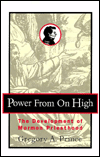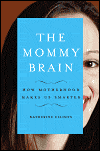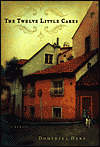 This didn't do a whole lot for me; I'm not entirely sure why. I ended up just skimming most of it.
This didn't do a whole lot for me; I'm not entirely sure why. I ended up just skimming most of it.
BestBooks is a record of all of the books that I have read since November 2004, with brief descriptions and reviews.
Thursday, August 31, 2006
Wednesday, August 30, 2006
Standing in the Rainbow by Fannie Flagg
Sunday, August 27, 2006
The Twelve Little Cakes: Memoir of a Prague Childhood by Dominika Dery
The Book of Revelation by G. K. Beale
The Book of Revelation by Robert Mounce
Sunday, August 20, 2006
Juanita Brooks: Mormon Woman Historian by Levi Peterson
 This is a fabulous and important book. Brooks is up there with Laurel Thatcher ulrich in my pantheon of heroes: Mormon women who persued their academic interests while raising their families. Her story is fascinating and her work on the Mountain Meadows Massacre is of lasting importance. This book had just a little flab that could have been trimmed, but is still highly recommended.
This is a fabulous and important book. Brooks is up there with Laurel Thatcher ulrich in my pantheon of heroes: Mormon women who persued their academic interests while raising their families. Her story is fascinating and her work on the Mountain Meadows Massacre is of lasting importance. This book had just a little flab that could have been trimmed, but is still highly recommended.
Saturday, August 19, 2006
Thinning the Herd--Take Two
It's that time again. Here's what I took to Half Price Books today:
Mountains beyond Mountains by Tracy Kidder
Flu by Gina Kolata
Molecules at an Exhibition by John Emsley
The Sleepwalkers by Arthur Koestler
Patenting the Sun by Jane Smith
Walk on Water by Michael Ruhlman
Stiff by Mary Roach
The Prize Winner of Defiance, Ohio by Terry Ryan
blink by Malcolm Gladwell
The Tipping Point by Malcolm Gladwell
Complications by Atul Gawande
Blue Latitudes by Tony Horowitz
The Handmaid's Tale by Margaret Atwood
The Devil in the White City by Erik Larson
The Good Earth by Pearl Buck
Isaac's Storm by Erik Larson
In a Sunburned Country by Bill Bryson
Personal History by Katherine Graham
Honeymoon in Purdah by Alison Wearing
Fortunate Son by Lewis Puller
The Secret Life of Bees by Sue Monk Kidd
The Mermaid Chair by Sue Monk Kidd
Alexandra by Carolly Erickson
The Emperor of Ocean Park by Stephen Carter
The Lovely Bones by Alice Sebold
Crossing to Safety by Wallace Stegner
Lindbergh by A. Scott Berg
Cheaper by the Dozen by Frank Gilbreth
Christmas Books by Charles Dickens
Snow Falling on Cedars by David Guterson
The Kite Runner by Khaled Hossenini
Bodies in Motion and at Rest by Thomas Lynch
Unto the Sons by Gay Talese
Nisa by Marjorie Shostak
Ship of Gold in the Deep Blue Sea by Gary Kinder
The Girl in the Picture by Denise Chong
Rising Tide by John Barry
Complete Works of Wlliam Shakespeare
Family Matters by David Guterson
Kingdom of Children by Mitchell Stevens
Dictionary of First Names
On Becoming baby Wise
The Best Baby Name Book
The Island of Lost Maps by Miles Harvey
Dust Tracks on a Road by Zora Neale Hurston
Their Eyes Were Watching God by Zora Neale Hurston
Collapse by Jared Diamond
Why We Eat What We Eat by Raymond Sokolov
American Pie by Pascale Le Draoulec
The Poisonwood Bible by Barbara Kingsolver
Fast Food Nation by Eric Schlosser
Under the Tuscan Sun by Frances Mayes
The Undertaking by Thomas Lynch
Lenin's Tomb by David Remnick
Mountains beyond Mountains by Tracy Kidder
Flu by Gina Kolata
Molecules at an Exhibition by John Emsley
The Sleepwalkers by Arthur Koestler
Patenting the Sun by Jane Smith
Walk on Water by Michael Ruhlman
Stiff by Mary Roach
The Prize Winner of Defiance, Ohio by Terry Ryan
blink by Malcolm Gladwell
The Tipping Point by Malcolm Gladwell
Complications by Atul Gawande
Blue Latitudes by Tony Horowitz
The Handmaid's Tale by Margaret Atwood
The Devil in the White City by Erik Larson
The Good Earth by Pearl Buck
Isaac's Storm by Erik Larson
In a Sunburned Country by Bill Bryson
Personal History by Katherine Graham
Honeymoon in Purdah by Alison Wearing
Fortunate Son by Lewis Puller
The Secret Life of Bees by Sue Monk Kidd
The Mermaid Chair by Sue Monk Kidd
Alexandra by Carolly Erickson
The Emperor of Ocean Park by Stephen Carter
The Lovely Bones by Alice Sebold
Crossing to Safety by Wallace Stegner
Lindbergh by A. Scott Berg
Cheaper by the Dozen by Frank Gilbreth
Christmas Books by Charles Dickens
Snow Falling on Cedars by David Guterson
The Kite Runner by Khaled Hossenini
Bodies in Motion and at Rest by Thomas Lynch
Unto the Sons by Gay Talese
Nisa by Marjorie Shostak
Ship of Gold in the Deep Blue Sea by Gary Kinder
The Girl in the Picture by Denise Chong
Rising Tide by John Barry
Complete Works of Wlliam Shakespeare
Family Matters by David Guterson
Kingdom of Children by Mitchell Stevens
Dictionary of First Names
On Becoming baby Wise
The Best Baby Name Book
The Island of Lost Maps by Miles Harvey
Dust Tracks on a Road by Zora Neale Hurston
Their Eyes Were Watching God by Zora Neale Hurston
Collapse by Jared Diamond
Why We Eat What We Eat by Raymond Sokolov
American Pie by Pascale Le Draoulec
The Poisonwood Bible by Barbara Kingsolver
Fast Food Nation by Eric Schlosser
Under the Tuscan Sun by Frances Mayes
The Undertaking by Thomas Lynch
Lenin's Tomb by David Remnick
Saturday, August 12, 2006
Word Biblical Commentary: Isaiah (Volumes 34 and 35)

This was OK, but just OK. I'm not sure how much to blame the commentaries I read and how much to blame Isaiah, but this was a very disappointing experience for me. It may be that the Book of Mormon led me to expect to get so much out of Isaiah, and it just didn't happen. It may be that I was expecting to 'get' Isaiah in a way that I hadn't before, and that (despite the hundreds--thousands--of pages I read) didn't happen. I don't know. In any case, this is the first time that I have studied a book in depth only to like it less at the end than I did before. Again--whether the fault belongs to the commentaries I read or other factors, I can't say. But I'm sure glad I'm done with Isaiah.
The Prophecy of Isaiah by J. Alec Motyer
Isaiah: Prophet, Seer, and Poet by Victor Ludlow
This is the only LDS commentary that I have ever read that is worth recommending. I think he occassionally adopts traditional LDS positions that don't have enough to support them, but for the most part, this is responsible scholarship. At the same time, I think it only removes about 40% of the Isaiah fog--readers who want more than that will be disappointed.
Thursday, August 10, 2006
Misquoting Jesus: The Story Behind Who Changed the Bible and Why by Bart Ehrman
 This is an important and fabulous book. Very little of the material was new to me, but it was still a very useful read to have a basic introduction to textual criticism wrapped up in a nice, neat little package instead of scattering all over--the way that I picked it up in school. While this book would be a killer for someone who thinks the scriptures are inerrant, I think a fairly conservative Saint could handle it--the confirmations of the Church's attitude toward scripture ("insofar as it is translated correctly" and "corrupt and designing priests" come to mind) will be enough to tide them over through the tough parts. (I don't think most people know that the story of the woman taken in adultery is not original to the text.) This book is highly recommended to anyone with any interest in the Bible and is essential reading to anyone who wants to seriously study the scriptures.
This is an important and fabulous book. Very little of the material was new to me, but it was still a very useful read to have a basic introduction to textual criticism wrapped up in a nice, neat little package instead of scattering all over--the way that I picked it up in school. While this book would be a killer for someone who thinks the scriptures are inerrant, I think a fairly conservative Saint could handle it--the confirmations of the Church's attitude toward scripture ("insofar as it is translated correctly" and "corrupt and designing priests" come to mind) will be enough to tide them over through the tough parts. (I don't think most people know that the story of the woman taken in adultery is not original to the text.) This book is highly recommended to anyone with any interest in the Bible and is essential reading to anyone who wants to seriously study the scriptures.
The Mommy Brain: How Motherhood Makes Us Smarter
 I just wasn't that interested in this. The thought that chemical changes brought on by pregnancy, lactation, and mothering might permanently change brain chemistry is certainly interesting, but I don't think there is enough data to really make her case. One can only read the phrase 'rat mother' so many times . . . and then the obligatory liberal-agenda-to-make-working-motherhood-painless at the end was extremely annoying.
I just wasn't that interested in this. The thought that chemical changes brought on by pregnancy, lactation, and mothering might permanently change brain chemistry is certainly interesting, but I don't think there is enough data to really make her case. One can only read the phrase 'rat mother' so many times . . . and then the obligatory liberal-agenda-to-make-working-motherhood-painless at the end was extremely annoying.
Sunday, August 06, 2006
T. Edgar Lyon: A Teacher in Zion by T. Edgar Lyon, Jr.
Brother Lyon, along with Lowell Bennion, taught at the U of U Institute in its formative years and represented an early, liberal strand of the CES. Lyon and Bennion left the U of U under unpleasant circumstances in 1962. T. Edgar Lyon's story may not be for the generalist, but it captures important data points in the growth of CES and the dramatic changes that affected the Church throughout the twentieth century.
Friday, August 04, 2006
The Lemon Tree by Sandy Tolan
 I listened to this on our Utah trip; it was phenomenal. I suppose I was expecting a quaint story of how a Jew and a Palestinian became friends; their tortured friendship is about ten percent of the book--the rest is a concise and fascinating history of Israel/Palestine. I had no idea how much I didn't know until I listened to this. Highly recommended.
I listened to this on our Utah trip; it was phenomenal. I suppose I was expecting a quaint story of how a Jew and a Palestinian became friends; their tortured friendship is about ten percent of the book--the rest is a concise and fascinating history of Israel/Palestine. I had no idea how much I didn't know until I listened to this. Highly recommended.
Thursday, August 03, 2006
King Leopold's Ghost by Adam Hochschild
 (I reviewed this a few weeks ago but apparently my review is lost in cyberspace.)
(I reviewed this a few weeks ago but apparently my review is lost in cyberspace.) This was a tremendous book--absolutely required reading. King Leopold of Belguim was a fascinatingly diabolical character and his exploitation of the Congo was beyond belief. And, as if all of that isn't bad enough, as the story is winding down and things seem to normalize, we find out that the CIA killed the first democratically-elected leader of the Congo. Unbelieveable. This well-written tale is much stranger--and more interesting--than fiction.
Morning by Morning: How We Homeschooled Our African American Sons to the Ivy League by Paula Penn-Nabrit
 This was disappointing. I suppose I imagined a WTM-type book, but this was short on details and long on her tale of racial woe. I 'get' the idea that the real problem in this country is that if you are a minority, you never know if the waitress' rudeness is because of her or because of you, but I seriously doubt that the stewardess who saw her family sitting in first class and asked, "What are they doing here?" was making a racial statement. Unless they were flying Confederate Air, I suspect such sentiments (which may very well exist) would at least be kept under wraps. In any case, there were a few interesting tidbits about homeschooling in general and about the juxtaposition of homeschooling and racial issues, but for the most part, this felt like a moralizing rant. Not to mention a bit of false advertising: How could that subtitle neglect to mention that one of those sons was kicked out of Princeton? Which brings us to a bigger issue: apparently their effort to have [almost] exclusively African or African-American male tutors backfired. This almost turns the book into a cautionary tale, but you'd never guess that from Penn-Nabrit's tone.
This was disappointing. I suppose I imagined a WTM-type book, but this was short on details and long on her tale of racial woe. I 'get' the idea that the real problem in this country is that if you are a minority, you never know if the waitress' rudeness is because of her or because of you, but I seriously doubt that the stewardess who saw her family sitting in first class and asked, "What are they doing here?" was making a racial statement. Unless they were flying Confederate Air, I suspect such sentiments (which may very well exist) would at least be kept under wraps. In any case, there were a few interesting tidbits about homeschooling in general and about the juxtaposition of homeschooling and racial issues, but for the most part, this felt like a moralizing rant. Not to mention a bit of false advertising: How could that subtitle neglect to mention that one of those sons was kicked out of Princeton? Which brings us to a bigger issue: apparently their effort to have [almost] exclusively African or African-American male tutors backfired. This almost turns the book into a cautionary tale, but you'd never guess that from Penn-Nabrit's tone.
Subscribe to:
Posts (Atom)
Blog Archive
-
▼
2006
(115)
-
▼
August
(16)
- Power from on High: The Development of Mormon Pri...
- Standing in the Rainbow by Fannie Flagg
- The Twelve Little Cakes: Memoir of a Prague Child...
- The Book of Revelation by G. K. Beale
- The Book of Revelation by Robert Mounce
- Juanita Brooks: Mormon Woman Historian by Levi Pe...
- Thinning the Herd--Take Two
- Word Biblical Commentary: Isaiah (Volumes 34 and 35)
- The Prophecy of Isaiah by J. Alec Motyer
- Isaiah: Prophet, Seer, and Poet by Victor Ludlow
- Misquoting Jesus: The Story Behind Who Changed th...
- The Mommy Brain: How Motherhood Makes Us Smarter
- T. Edgar Lyon: A Teacher in Zion by T. Edgar Lyon...
- The Lemon Tree by Sandy Tolan
- King Leopold's Ghost by Adam Hochschild
- Morning by Morning: How We Homeschooled Our Afric...
-
▼
August
(16)




